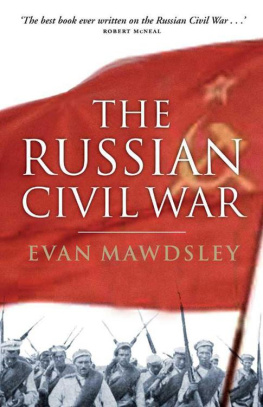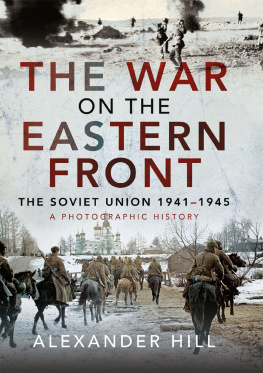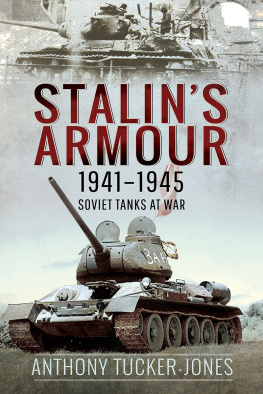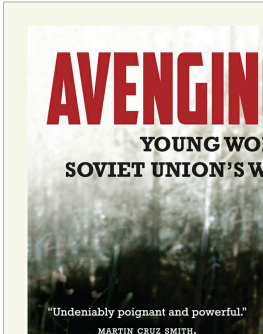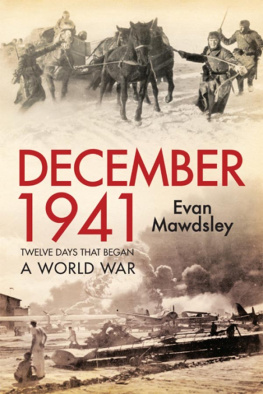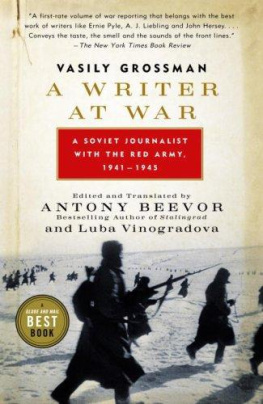Evan Mawdsley - Thunder in the East: The Nazi-Soviet War 1941-1945
Here you can read online Evan Mawdsley - Thunder in the East: The Nazi-Soviet War 1941-1945 full text of the book (entire story) in english for free. Download pdf and epub, get meaning, cover and reviews about this ebook. year: 2015, publisher: Bloomsbury Academic, genre: History. Description of the work, (preface) as well as reviews are available. Best literature library LitArk.com created for fans of good reading and offers a wide selection of genres:
Romance novel
Science fiction
Adventure
Detective
Science
History
Home and family
Prose
Art
Politics
Computer
Non-fiction
Religion
Business
Children
Humor
Choose a favorite category and find really read worthwhile books. Enjoy immersion in the world of imagination, feel the emotions of the characters or learn something new for yourself, make an fascinating discovery.

- Book:Thunder in the East: The Nazi-Soviet War 1941-1945
- Author:
- Publisher:Bloomsbury Academic
- Genre:
- Year:2015
- Rating:3 / 5
- Favourites:Add to favourites
- Your mark:
- 60
- 1
- 2
- 3
- 4
- 5
Thunder in the East: The Nazi-Soviet War 1941-1945: summary, description and annotation
We offer to read an annotation, description, summary or preface (depends on what the author of the book "Thunder in the East: The Nazi-Soviet War 1941-1945" wrote himself). If you haven't found the necessary information about the book — write in the comments, we will try to find it.
Thunder in the East: The Nazi-Soviet War 1941-1945 — read online for free the complete book (whole text) full work
Below is the text of the book, divided by pages. System saving the place of the last page read, allows you to conveniently read the book "Thunder in the East: The Nazi-Soviet War 1941-1945" online for free, without having to search again every time where you left off. Put a bookmark, and you can go to the page where you finished reading at any time.
Font size:
Interval:
Bookmark:
THUNDER IN THE EAST
Modern Wars
Series editor: Hew Strachan
Chichele Professor of the History of War, All Souls College, University of Oxford (UK)
Advisory editor: Michael Howard
Emeritus Fellow of All Souls College, University of Oxford (UK)
Covering the period from 1792 to the present day, the Modern Wars series explores the global development of modern war. Military history is increasingly an integrated part of total history, and yet this is not always reflected in the literature. The Modern Wars address this need, offering well-rounded and balanced synoptic accounts of the major conflicts of the modern period. Each volume recognizes not only the military, but also the diplomatic, political, social, economic and ideological contexts of these wars. The result is a series that ensures a genuine integration of the military history with history as a whole.
Published:
The South African War , Bill Nasson (1999)
The Crimean War , Winfried Baumgart (1999)
Allies in War , Mark A. Stoler (2005)
The First World War (Second Edition), Holger Herwig (2014)
Forthcoming :
New Order Diplomacy , Martin Folly (2016)
For Gillian, Michael and Robyn
THUNDER IN THE EAST: THE NAZISOVIET WAR 19411945
SECOND EDITION
Evan Mawdsley
Bloomsbury Academic
An imprint of Bloomsbury Publishing Plc

CONTENTS
AA | anti-aircraft (gun) |
AFV | armoured fighting vehicle |
AT | anti-tank (gun) |
C-in-C | Commander-in-Chief |
GKO | ( Gosudarstvennyi Komitet Oborony ) State Defence Committee |
GULAG | Soviet Main Administration of Labour Camps |
KTB | Kriegstagebuch (war diary) |
MD | military district |
NCO | non-commissioned officer |
NKO | Peoples Commissariat of Defence |
NKVD | Peoples Commissariat of Internal Affairs , i.e. the secret police |
OKH | ( Oberkommando des Heeres ) German Army High Command |
OKW | ( Oberkommando der Wehrmacht ) German Armed Forces High Command |
OO | ( Osobyi otdel , Special Section) NKVD counter-intelligence within the Red Army |
PVO | ( Voiska Protivovozdushnoi oborony strany ) Air Defence Forces |
Pz Kpfw | ( Panzerkampfwagen ) German abbreviation for tank |
RSFSR | Russian Soviet Federative Socialist Republic |
SMERSH | ( Smert shpionam , Death to spies) counter-intelligence organ in the Red Army |
SP gun | self-propelled gun |
When, in 1970, Basil Liddell Harts History of the Second World War was published in Britain, it marked the end of an era. One reason was that it was published after the death of its author. More importantly, it represented an approach to its subject that even then looked dated. Liddell Harts war was one fought and won in the West; he paid more attention to the North African campaign, to which the Germans had allocated two divisions in 1941, than to Russia, to which they had devoted seventy-five times that number. This was a story of the war that travelled from Dunkirk to D-Day, by way of El Alamein.
In those days the English-speaking historians who did write about the war on the Eastern Front approached their subject from the perspective of the Germans, and especially that of the German generals. Liddell Hart himself had interviewed many of them after the war, and he and others had been midwives in the translation of their memoirs into English. Here was a Wehrmacht that was politically innocent, a supremely able but also honourable fighting force, unsullied by the worst excesses of Nazism, the professional competence of its officers constantly subverted by the interventions of Hitler, especially in the conduct of the defensive battles which the German Army was condemned to fight after 1943. The Cold War made the lessons the Germans had learnt in combating a Soviet invasion of Europe of greater moment than historical context. Atrocities were not a necessary part of this narrative, and if they were acknowledged, they were blamed on the Nazi Party and its military arm, the Waffen-SS, not the Wehrmacht: such a demarcation made life easier for everyone, for Germans anxious to draw a line under the past and for NATO needing the manpower of a new West German Army, the Bundeswehr .
The Wehrmacht was complicit in war crimes and particularly so on the Eastern Front. The massive ten-volume history of Germany in the Second World War, Das deutsche Reich und der zweite Weltkrieg , prepared by the Bundeswehr s own military history section, makes this clear, particularly in the contributions of Jrgen Frster. The German public has been confronted with the acts of its fathers and grandfathers in a deeply controversial and profoundly unsettling touring exhibition, originating in Hamburg, whose catalogue was published in 2002. Neither Heinz Guderian, the panzer general appointed chief of the General Staff in the wake of the bomb plot against Hitler in July 1944, nor Erich von Manstein, who devised the plan that led to the breakthrough against France in May 1940, and who commanded, first, an army and, then, an army group in Russia, look as innocent now as they managed to do in the 1950s. Both of them were generals whose reputations were refurbished by Liddell Hart, and yet Guderian was a committed Nazi and Manstein ordered the extermination of Jews and Bolsheviks.
Today our picture of the German Army of the Second World War is therefore very different from that which was shaped by Rommels Afrika Korps and the notion of a war without hate (to use Rommels own description of the North African campaign). The war in the East was fought with a bestiality and ferocity by both sides that raise questions about its links to totalitarianism and its methods. As Evan Mawdsley makes clear in his conclusion, this was a deeply politicized war, even if it was not a rational one: politics and reason are, unfortunately, not synonymous. Professor Mawdsley does not let himself get drawn into the Holocaust itself, but he points out that the solution to the Jewish question proposed by the Nazis in 1941 was the forced resettlement of European Jewry in Asiatic Russia. This proposal was undermined by Germanys failure to defeat the Soviet Union in short order, and thus the path was opened to another more final and even more awful solution. Moreover, whether violence begets more violence is a moot but highly relevant point. The vocabulary used to motivate the soldiers of the Wehrmacht in battle could be transferred to those policemen as well as soldiers tasked with extermination. War legitimizes behaviour in the individual that is beyond the pale in peacetime. Did the extraordinary losses inflicted on the Eastern Front make it easier to carry out murder in the death camps?
The Soviet Union was also a totalitarian regime. Moreover, before the invasion of 1941, it had shown itself even readier than Germany to inflict massive losses on its own peoples in the name of progress and political conformity. It was Russias war about which Liddell Hart was particularly ill-informed. By 1970 the combination of linguistic ignorance, tainted historical writing and deep distrust had erected an impenetrable barrier between the peoples of the West and their appreciation of the achievements of the Red Army. In 1975, John Erickson began to tear down these obstacles with the publication of The Road to Stalingrad , followed in 1983 by The Road to Berlin . Since then, other scholars, notably Earl Ziemke and David Glantz, have written prolifically on the subject, and Antony Beevor has shown that it is one which appeals to an English-speaking readership on a massive scale.
Next pageFont size:
Interval:
Bookmark:
Similar books «Thunder in the East: The Nazi-Soviet War 1941-1945»
Look at similar books to Thunder in the East: The Nazi-Soviet War 1941-1945. We have selected literature similar in name and meaning in the hope of providing readers with more options to find new, interesting, not yet read works.
Discussion, reviews of the book Thunder in the East: The Nazi-Soviet War 1941-1945 and just readers' own opinions. Leave your comments, write what you think about the work, its meaning or the main characters. Specify what exactly you liked and what you didn't like, and why you think so.

